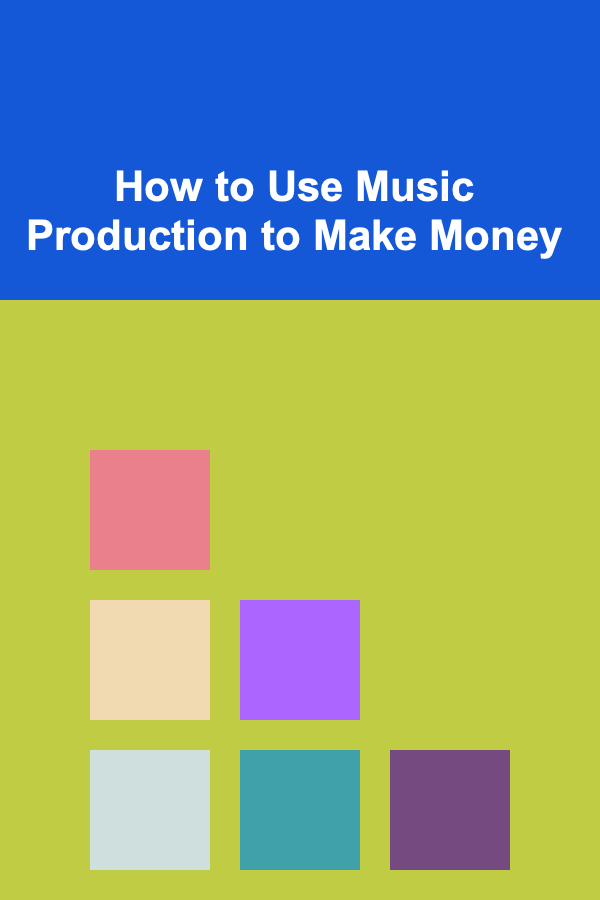
How to Use Music Production to Make Money
ebook include PDF & Audio bundle (Micro Guide)
$12.99$8.99
Limited Time Offer! Order within the next:

Music production is not only an art but also a thriving business. With advancements in technology, the barriers to entry for music production have lowered, allowing anyone with a computer and the right software to start creating music. The vast potential of music production to generate income is often overlooked by many, but with the right approach, music production can be transformed from a passion into a profitable venture. Whether you are a producer, composer, songwriter, or sound engineer, there are numerous ways to monetize your skills in the music industry.
In this article, we will explore the various ways to leverage music production for making money, covering different aspects of the industry, and providing actionable tips to help you build a sustainable career or side business.
Understanding the Basics of Music Production
Before diving into the many money-making opportunities within music production, it's important to understand what music production entails. Music production involves the process of creating, recording, arranging, mixing, and mastering music. This can be applied to a wide range of genres, from pop and hip-hop to electronic dance music (EDM) and classical music.
Music producers typically use digital audio workstations (DAWs) like Ableton Live, Logic Pro, FL Studio, or Pro Tools to create and manipulate sounds. In addition to technical skills, music production requires creativity, a good ear for music, and an understanding of how different elements of a track come together.
Selling Your Music Online
One of the most direct ways to make money through music production is by selling your music online. In today's digital age, platforms like Spotify, Apple Music, SoundCloud, and Bandcamp have revolutionized how music is distributed, making it easier than ever for producers to sell their work to a global audience.
2.1 Distribute Through Digital Platforms
- Spotify and Apple Music: These platforms allow you to distribute your music to millions of listeners worldwide. However, gaining visibility on these platforms can be challenging. To get your music on Spotify and Apple Music, you'll need to work with digital distribution services like TuneCore, DistroKid, or CD Baby, which handle the logistics of getting your tracks on these platforms.
- SoundCloud: While SoundCloud doesn't have the same vast reach as Spotify or Apple Music, it is still a valuable platform for independent artists and producers. By uploading your music to SoundCloud, you can build a fanbase, gain feedback, and even monetize your music through the platform's Partner Program.
- Bandcamp: Bandcamp is a great platform for independent artists to sell their music directly to their audience. You can set your prices, offer discounts, and even sell merchandise alongside your music. Bandcamp is especially popular for niche genres and smaller artists.
2.2 Selling Beats and Instrumentals
Producers often create beats and instrumentals, which are valuable to artists, content creators, and businesses. By selling beats online, you can turn your instrumental tracks into a profitable business. There are several platforms where you can sell beats, such as:
- BeatStars: BeatStars is a popular marketplace for producers to sell their beats and instrumentals. It allows you to set different licensing options, such as exclusive or non-exclusive licenses, and offers features like automatic payment processing and promotional tools.
- Airbit: Airbit is another platform similar to BeatStars that lets you sell your beats. It also includes features like instant beat delivery, a customizable storefront, and analytics to track your sales.
- Traktrain: Traktrain is a beat marketplace focused on high-quality beats. It allows producers to sell their beats and provides an audience of serious buyers.
Selling beats is a great way to earn passive income as producers can sell the same beat multiple times under non-exclusive licenses. Exclusive licenses, on the other hand, offer a higher payout but limit the number of times the beat can be sold.
Licensing Music for TV, Film, and Commercials
Music licensing is one of the most lucrative ways to make money as a music producer. Licensing your music means granting others the right to use your music in exchange for a fee. This is commonly done for television shows, movies, commercials, video games, and other media. Music licensing deals can range from small fees for background music in a YouTube video to larger deals for a song featured in a major film or ad campaign.
3.1 Music Libraries
There are several online platforms where you can upload your music for licensing. These platforms work as intermediaries between artists and companies looking to license music. Popular music licensing platforms include:
- Audiojungle: Audiojungle is part of the Envato Market and allows music producers to sell their tracks for licensing. The platform is widely used by content creators, filmmakers, and businesses looking for music for their projects.
- Pond5: Pond5 is another large marketplace for music licensing, where you can upload your music and make it available for licensing. It also covers sound effects and stock footage, making it a one-stop-shop for media creators.
- Artlist: Artlist is a growing platform that provides high-quality music for licensing to filmmakers, YouTubers, and advertisers. It's known for its user-friendly interface and exclusive music library, which can be a great way to get your tracks in front of content creators.
3.2 Sync Licensing
Sync licensing is the process of licensing music to be used in synchronization with visual media, such as TV shows, movies, commercials, or video games. The licensing fee for a sync deal can vary greatly depending on the prominence of the production and the artist. However, sync licensing can be incredibly lucrative and provide long-term income as the music continues to be used.
To get into sync licensing, you can:
- Submit music directly to music supervisors: Music supervisors are responsible for selecting and licensing music for films, TV shows, and commercials. Many supervisors have connections with publishers and production companies, making it easier for you to find opportunities.
- Join a music publishing company: Music publishers can help place your music in TV, film, and commercial projects. They often have established relationships with music supervisors and can pitch your music for licensing opportunities.
Producing Custom Music for Clients
Another way to monetize music production is by creating custom tracks for clients. Many businesses, content creators, and individuals need custom music for a variety of purposes, including:
- Advertising: Many companies hire music producers to create custom jingles or background music for their ads. These deals can pay well and often result in long-term working relationships.
- Video Games: The gaming industry is another major source of revenue for music producers. Video game developers often require original compositions and sound effects to enhance the gaming experience.
- Podcasts and YouTube Channels: Independent creators such as podcasters and YouTubers often need original music for their content. Offering custom intros, outros, and background music for podcasts or video channels can be a consistent source of income.
To attract clients, you can:
- Create a portfolio: Build an online portfolio that showcases your best work. Websites like SoundCloud, Bandcamp, and even a personal website are great places to display your music.
- Network: Attend industry events, such as music conferences, workshops, and webinars, to connect with potential clients. Online communities like LinkedIn and Facebook groups also provide opportunities to network with businesses and content creators looking for music.
- Offer a range of services: As a producer, you may want to diversify your offerings. This could include composing original tracks, remixing existing songs, or producing sound design for film and television.
Teaching Music Production
If you have a deep understanding of music production, another avenue to explore is teaching others. With the increasing popularity of online learning, many aspiring producers are looking for experts who can teach them the ins and outs of the craft. Whether you're teaching beginner-level music production or advanced techniques, you can turn your knowledge into a profitable business.
5.1 Online Courses and Tutorials
One of the most popular ways to teach music production is through online courses. Platforms like Udemy , Skillshare , and Teachable allow you to create and sell courses to a global audience. By creating detailed tutorials on music production, mixing, mastering, or specific DAW software, you can earn income while helping others develop their skills.
5.2 Private Lessons
In addition to online courses, you can also offer private music production lessons. With the rise of video conferencing platforms like Zoom and Skype, teaching music production remotely has become easier than ever. You can set up one-on-one sessions with students and tailor lessons to their specific needs, whether it's helping them learn how to use a DAW or giving them advice on producing their first track.
Building a Personal Brand
As with any career in the creative industries, building a strong personal brand is key to long-term success. In the competitive world of music production, standing out from the crowd can be difficult. However, by developing a personal brand, you can attract more clients, collaborators, and fans.
6.1 Social Media Marketing
Social media platforms like Instagram, TikTok, Twitter, and YouTube are powerful tools for building a personal brand. As a music producer, you can use these platforms to showcase your work, share behind-the-scenes content, and interact with fans and potential clients. Here are some tips for effective social media marketing:
- Consistency: Post regularly to stay top of mind and engage with your followers.
- Content variety: Share a mix of content, including music production tips, live streams, collaborations, and personal stories to connect with your audience.
- Collaborations: Collaborating with other musicians, producers, and influencers can help expand your reach and attract new followers.
6.2 Building a Website
A personal website is a great way to showcase your portfolio, offer services, and build a professional presence. Your website should include your bio, samples of your music, a list of services you offer, and a way for potential clients to contact you.
Conclusion
Music production offers many opportunities to make money, whether you're selling music directly to consumers, licensing your work for TV and film, producing custom tracks for clients, or teaching others. With the right strategies and dedication, you can turn your passion for music production into a profitable business. Remember, success in this field requires not only technical skills but also creativity, business acumen, and networking. By diversifying your income streams and building a strong personal brand, you can create a sustainable and rewarding career in music production.

How to Create a Personal Safety Plan for Emergencies
Read More
How to Design a Data Analysis Checklist for Cleaning Raw Data
Read More
How to Develop a Checklist for Data Backup and Recovery
Read More
How to Keep Your Home Office Clutter-Free with Proper Storage
Read More
How to Save Money: Cutting Down on Restaurant and Coffee Shop Expenses
Read More
How to Store Extra Bedding and Towels Without Taking Up Room
Read MoreOther Products

How to Create a Personal Safety Plan for Emergencies
Read More
How to Design a Data Analysis Checklist for Cleaning Raw Data
Read More
How to Develop a Checklist for Data Backup and Recovery
Read More
How to Keep Your Home Office Clutter-Free with Proper Storage
Read More
How to Save Money: Cutting Down on Restaurant and Coffee Shop Expenses
Read More